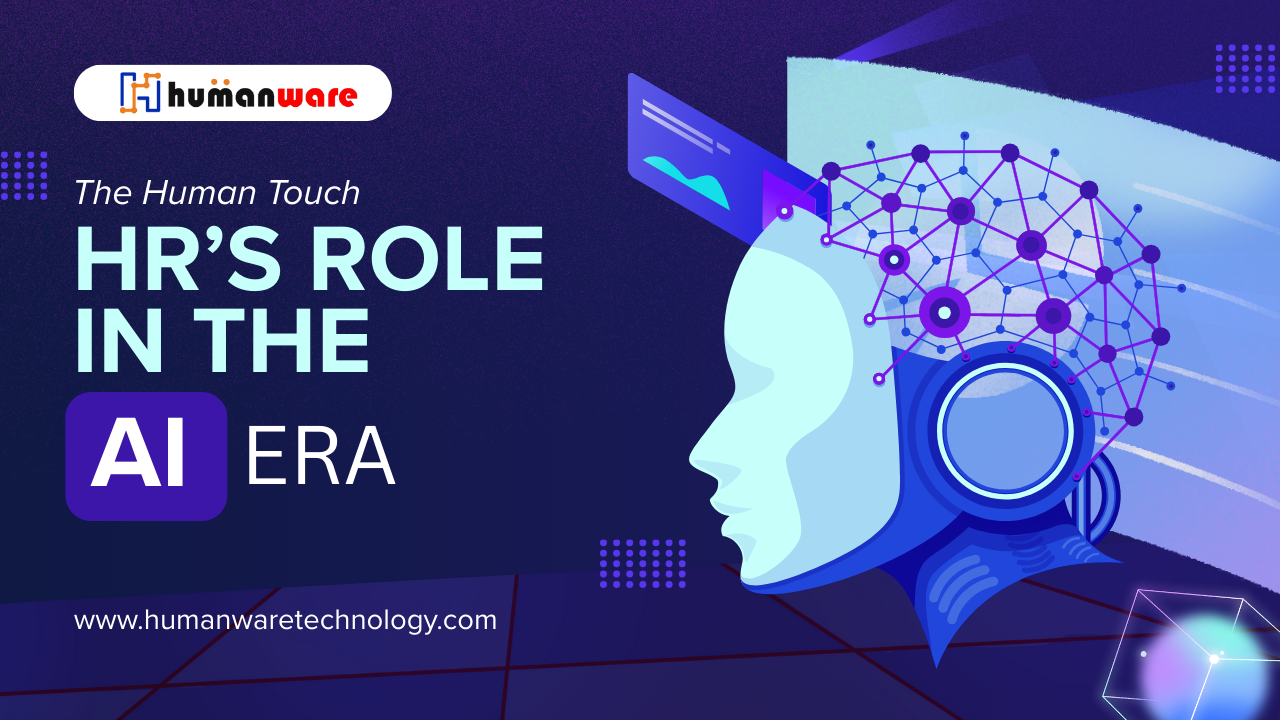
Keeping HR Human in the AI Era
The world is rapidly evolving, transforming every field of profession, especially artificial intelligence (AI). From recruitment to retirement, all HR tasks are being automated including hiring, employee performance management, employee expense accounting, and everything else related. AI-powered HR systems have automated countless tasks that previously required manual efforts. While this evolution ensures efficiency and accuracy, it also raises an important question how can we keep human touch in the age of algorithms and automation?
The solution lies in finding the right balance between ethics, empathy, and technology. HR isn't just about data and processes, it's also about people, trust, and culture. Let's explore how organizations can maintain this balance.
1. Why Ethics Matter in AI-Driven HR
As organizations increasingly use artificial intelligence (AI) for HRMS systems to optimize recruitment, performance evaluation, payroll processes, and HR analytics, the role of ethics is crucial. Offering and resulting AI carries the risk of bias, discrimination, and a lack of transparency if not monitored and monitored. For example, an AI-based recruitment tool may inadvertently favor certain demographic groups, and the analysis can be integrated with contextual factors such as mental health or personal challenges. Ethical AI in HR ensures that decisions remain fair, unbiased, and inclusive, protecting employees and employers from regulatory and reputational risks. By establishing core governance principles, verifying the auditability of algorithms, and transparently communicating with employees about their data disclosure, HR leaders can build trust and verify effectiveness. They believe that ethical AI practices protect human dignity and strengthen HR's responsibility to achieve a balance between innovation, integrity, and empathy.
2. Empathy: The Core of Human Resource Management
While automation and artificial intelligence (AI)-powered HRMS systems have transformed HR processes, empathy remains the foundation of effective workforce management. Employees don't just want accurate payrolls or faster vacation decisions: they want to feel valued, supported, and understood. AI can analyze engagement surveys, predict turnover, and even detect sentiment trends, but it can't replace the human connection that comes from genuine listening and caring communication. Empathy in HR means recognizing the emotional, cultural, and personal dimensions of each employee's experience, whether during sensitive discussions like performance reviews or conflict resolution, or during organizational change. By combining AI insights with empathetic leadership, HR professionals can create a company culture that is not only effective but also inclusive, supportive, and human-centered. This balance between technology and empathy ensures improved employee engagement, retention, and long-term organizational success.
3. The Human-AI Partnership in Recruitment
Recruiting is one of the HR functions that AI has revolutionized the most. AI-powered HRMS systems can now analyze thousands of resumes, evaluate candidates, and automate interview scheduling in minutes. This technology significantly reduces recruitment times and helps identify qualified talent more effectively. However, relying solely on AI risks overlooking key human factors like cultural fit, emotional intelligence, and adaptability—traits that algorithms cannot fully measure. Therefore, the future of recruiting relies on human-AI collaboration. While AI handles repetitive, data-intensive tasks like resume analysis and skills matching, HR professionals bring empathy, intuition, and contextual assessment to the process. Together, they create a recruiting strategy that is not only faster and more cost-effective, but also equitable, inclusive, and human-centric. By combining automation with human knowledge and expertise, organizations can attract top talent while ensuring candidates feel respected, engaged, and included throughout the entire recruitment process.
4. Building Trust Through Transparency
In the era of artificial intelligence (AI)-based HR systems, transparency is one of the most important factors in building trust between employees and organizations. While AI tools simplify processes like performance reviews, attendance tracking, and predictive analytics, employees often question how their personal data is collected, processed, and used. This lack of clarity can lead to distrust, resistance to technology adoption, and even job dissatisfaction. To address this, HR leaders must ensure open communication about the role of AI in decision-making. This includes explaining how algorithms work, providing employees with access to their own data, and implementing clear policies regarding AI ethics and data governance. Regular audits, integrity checks, and transparent reporting help demonstrate accountability, while employee training builds trust in new tools. By prioritizing openness and honesty, organizations can not only comply with data protection regulations but also create a culture of trust, security, and shared responsibility.
5. Creating a Human-Centered HR Strategy
As organizations adopt artificial intelligence (AI)-powered HRMS systems to maximize efficiency, it's crucial that technology implementation doesn't overshadow the human aspect of HR. A human-centric HR strategy goes beyond automation and puts employees at the center of every decision. This means designing HR policies, workflows, and AI tools that prioritize employee well-being, inclusion, and fulfillment while leveraging data for greater accuracy. For example, predictive analytics can identify employees at risk of disengagement, but only a thoughtful HR strategy can translate these insights into concrete actions, such as mentoring, wellness programs, or career development opportunities. By combining AI capabilities with empathetic leadership, HR teams can build a company culture where employees feel valued, supported, and empowered. Ultimately, a human-centric HR strategy ensures that digital transformation enhances, rather than replaces, the interpersonal relationships that drive loyalty, engagement, and organizational success.
Conclusion
The rise of artificial intelligence (AI) in HR is inevitable, but humans must remain at the heart of workforce management. Ethics ensures integrity, and empathy fosters relationship building. By responsibly implementing an AI-powered HRMS, organizations can strike a balance between efficiency and humanity, creating work environments that are not only intelligent but also caring. Together, they create a recruiting strategy that is not only faster and more cost-effective, but also equitable, inclusive, and human-centric. By combining automation with human knowledge and expertise, organizations can attract top talent while ensuring candidates feel respected, engaged, and included throughout the entire recruitment process.